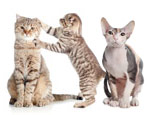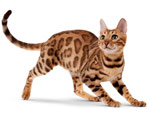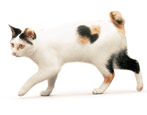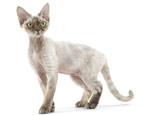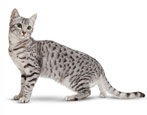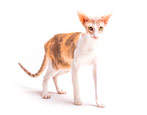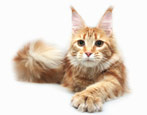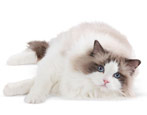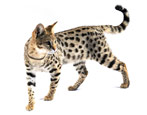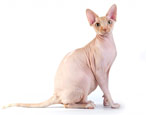Newborn kittens: development and care rules
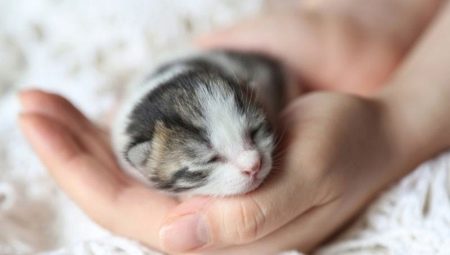
Having a cat at home, sooner or later the question of offspring arises. If the pet is purebred, then getting a litter may even be beneficial. To help a cat and properly care for newborn kittens, you need to know the basics of their development in the first days and weeks, the daily routine and nutrition. With the right actions, kittens will quickly gain weight and get stronger, after which they can be gifted, sold or kept.
Development features
Cats are good and caring mothers, they are able to fully take care of their cubs themselves, a person does not need to interfere in this process. In nature, a cat itself finds a suitable place, equips itself there a corner and it is there that gives birth and cares for its babies. In an apartment, it is more difficult to do this, so the owner can help arrange a comfortable and quiet place where a mother can be alone with her children.
When choosing a place for pets, you need to look for a sufficiently shaded part of the room, where bright light does not fall... In the first weeks, kittens will need peace and quiet, so the resting place should be maximally taken away from the common room and corridor.
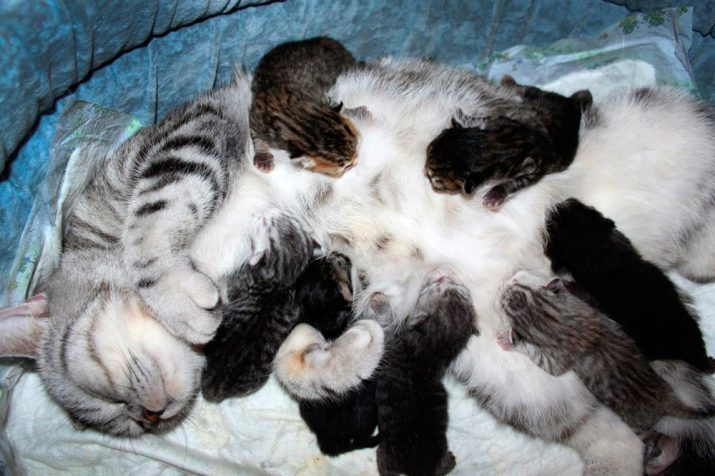
The room temperature should be fairly high to keep newborn babies from freezing. The optimal range is + 21– + 25 degrees... It is very important to avoid drafts so that small animals do not catch cold. Airing the room in the first weeks is not worth it at all, the cat itself can provide a change in temperature. After the birth of kittens, it is necessary to examine them, check for signs of life and the normal appearance of pets.
If the babies squeak and move, then they are in perfect order. If a kitten looks suspicious or has some obvious signs of a developmental defect, it is worth putting him to sleep right away so that the mother does not have time to become attached to him and does not waste her energy and resources on someone who will not survive anyway. Normal kittens are born blind and deaf, these senses begin to work a little later.
Newborn kittens they open their eyes about a week after birth, and they will be able to consciously see in another 5 days. If this does not happen for a long time, then you can try to help the baby with a cotton pad moistened with water, which is used to wipe the eyes. The color of the eyes in newborn animals is usually light, but after three weeks the iris of the eye acquires its main shade.
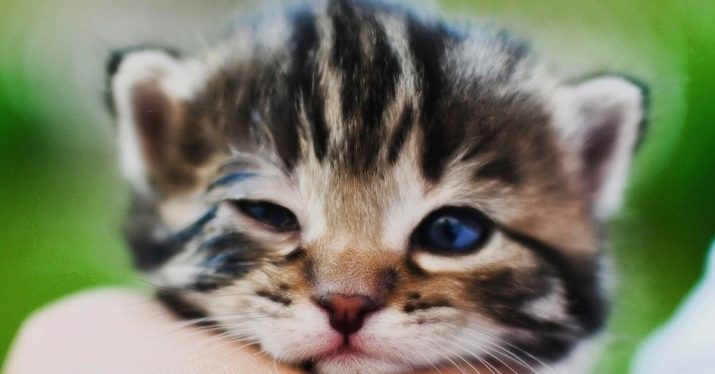
A small pet does not need to navigate in space, since there is a mother nearby who will take full care of him. This care is carried out around the clock until the kittens begin to see and hear. In newborns, hearing appears on about the eighth day, and until that moment the ears are pressed to the head. Three weeks later, the kitten begins to look like an adult, as it sees well, has erect ears, learns to walk and learns the world around it.
Newborn animals rest or eat most of the time, so they do not yet feel the need for active movement. After 18 days from the moment of birth, the duration of wakefulness increases significantly, the pets try to stand on their paws. The training lasts only a few days, usually by the 21st day, they already begin to walk.
To fully master all the skills and learn how to use them, babies need only a week. After that, they strive to go beyond their habitat in order to learn as much as possible about everything that surrounds them.
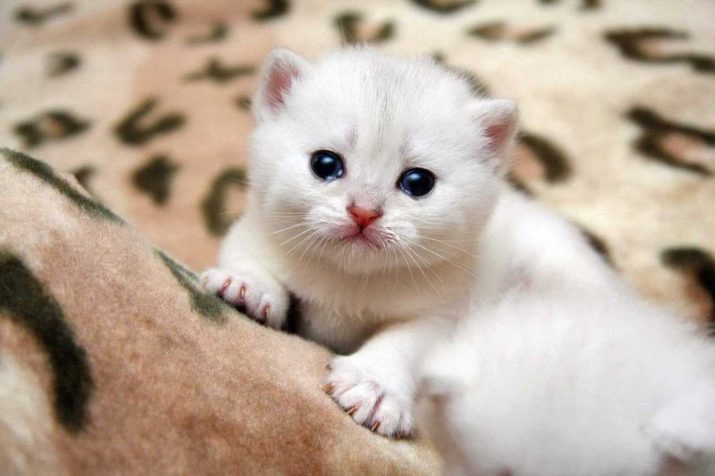
At first, kittens eat exclusively mother's milk, which must be quite fat to saturate all the offspring. The owner is already watching over the quality of the cat's food. As soon as the babies have milk teeth, they begin to eat on a par with their mother, from a bowl. At the time of birth, the kitten weighs about 100 grams, and in the very first week of life, they can become 2-3 times more. Weight every day grows by 15–20 grams with proper feeding of the mother and good nutrition of the baby.
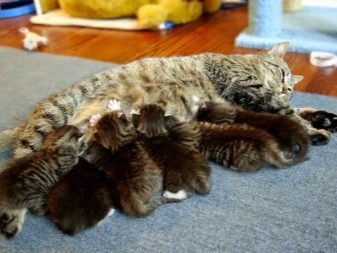
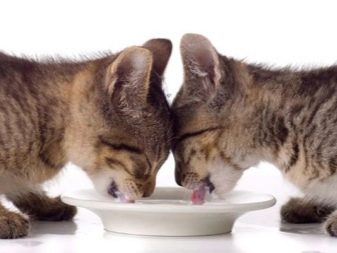
If in the first week there are serious deviations from the norms downward, then the kitten, most likely, will not survive.
Hygiene
Caring for kittens after childbirth falls on the cat, she by nature knows what to do and easily fulfills her duties. In addition to providing rest and feeding, the cat helps its offspring to empty. In newborn kittens, the processes of urination and defecation do not occur on their own, they need to be stimulated from the outside. The cat performs this procedure as follows:
- licking the fur of each kitten to keep it clean, which is important for the safety of the pet; active actions in the area of the organs of the excretory system stimulates the emptying of the bladder and intestines;
- to maintain cleanliness in the kittens' habitat, the cat absorbs all the secretions of the offspring, preventing them from staining and harming the babies;
- protects droppings from bacteria with its saliva, which remains on the skin of babies after licking.
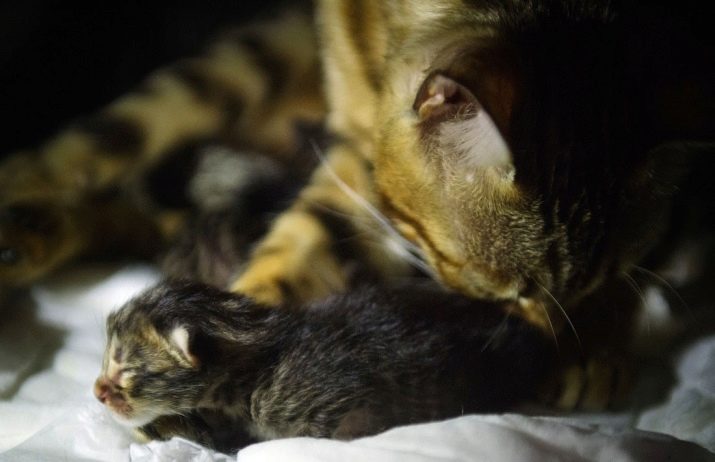
If the kittens were immediately taken away from their mother, then a person will have to take care of them. It is impossible to completely replace the cat, but with the help of imitation, animals can be helped a lot. To establish digestion processes, it is necessary to find linen or other natural and slightly rough tissue and moisten it in a heated solution of potassium permanganate. Massage movements need to go over the abdomen and anus, continuing the procedure until the body is emptied.
You need to repeat this procedure after each meal, making sure that every time there is excretion of urine and at least 2-3 times a week - feces.
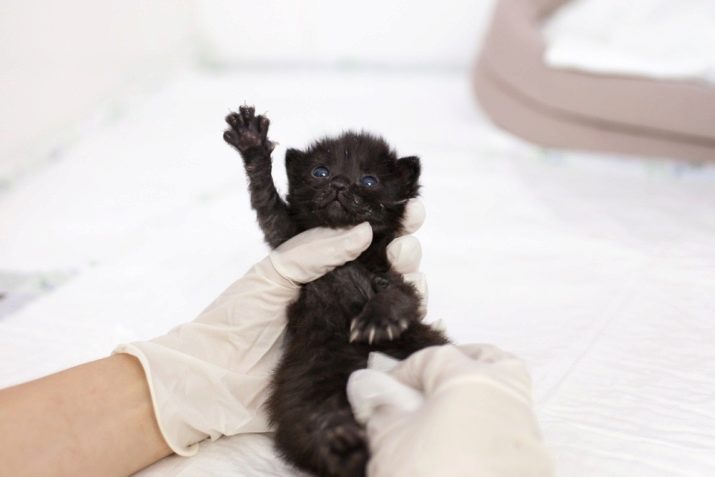
Hygiene procedures involve not only carrying out certain actions and maintaining the cleanliness of kittens, it is important to pay attention to the color of the feces, which can change, which signals the health of the pet, namely:
- Brown - a healthy individual;
- greenish - problems with the number of meals and their size, when the body does not have time to digest everything;
- Gray - significant overeating, which provokes inflammation and infectious diseases.
Important! It is possible to train kittens to the litter box only after three weeks, not earlier. As soon as the animals can see and hear well, walk normally and understand a lot, you can train them to go to the toilet in a clearly marked place.
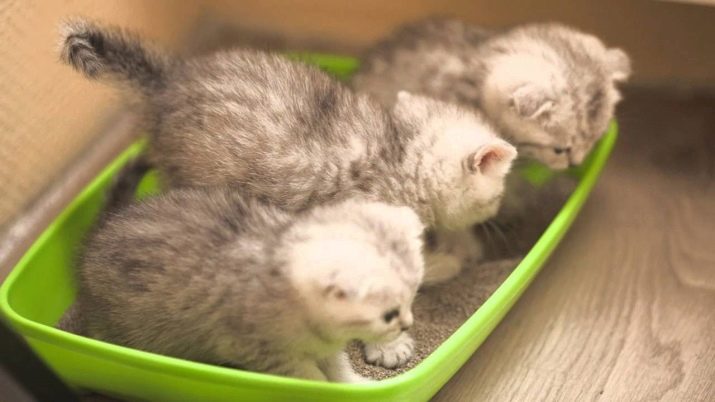
Hygiene of small kittens includes eye and nose care, which are wiped in case of discharge or odor. Every day you need to wash your baby until he can do it on his own.
The wool should be wiped with a damp cloth or cloth soaked in water. Bathing as such is absent during this period and may be necessary only in the case of severe pollution, which is difficult to get rid of with the help of wiping. If kittens live with a cat, you should pay attention to her health.
If suddenly she has fleas, they must be removed immediately, otherwise kittens may suffer, which may have allergies or a much more serious reaction to these parasites, which can be fatal.
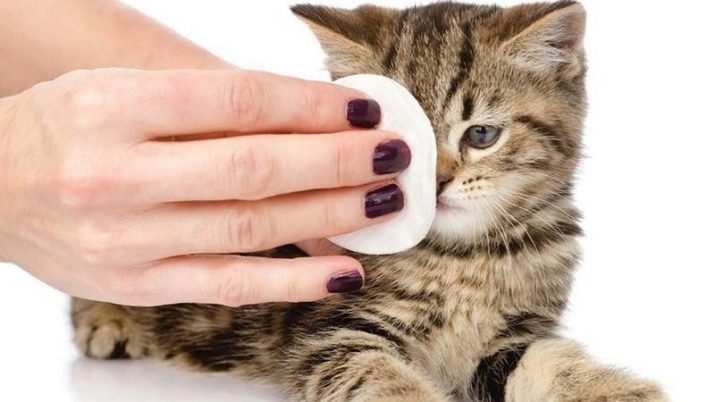
Tray training is an important step in caring for kittens. If they are not separated from their mother, then it is she who will show and lead them at the right time to the tray. If the owner takes care of the animals on his own, then the learning process will need to be done as soon as the kittens become a little more independent. It is best to push the emptying process on your own by massaging the kitten's body in the right places.
It is important to do this near the tray to ensure that the release product reaches its intended destination. Based on the smell of their bowel movements, babies will try to do everything on their own.
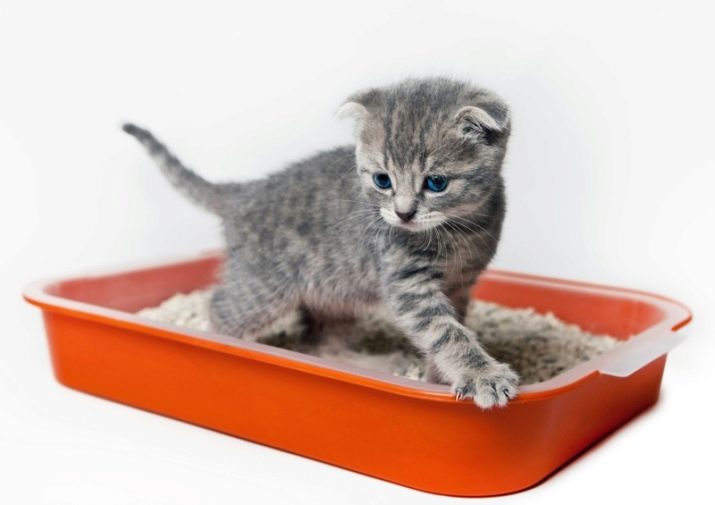
How to feed?
Kittens, who are with their mother after birth, feed exclusively on her milk. This diet is enough for them until they get stronger and grow up. If small animals are left without a cat, then a person has to feed them. Since cat's milk will not be available, it must be replaced with an equivalent product.
You cannot give cows milk to babies, it is not suitable for them. Infant formula and similar products also cannot replace breast milk.
In order not to cause a negative reaction of the body, you can dilute milk powder with water and feed the kittens from a bottle or with a pipette. If it is possible to purchase low-fat milk, then this option will be most convenient for feeding. Small pets should only be given fresh food to keep it from standing. It is important to rinse and steam the bottles or dropper thoroughly after each meal.
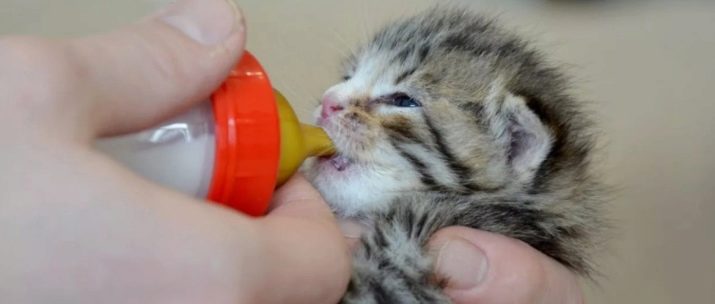
A newborn kitten grows rather quickly and gains weight, which is primarily due to the optimal amount of food that it absorbs. Depending on the age, the number of feedings and the size of the portion will change as follows:
- from the moment of birth and during the first week of life, you need to feed the kitten every 2 hours, giving him 5 ml of milk;
- from the second to the third week, 5 ml of food is also issued, but at intervals of 2.5 hours;
- the third week schedule assumes an increase in the interval between meals up to three hours;
- the last week of the first month of life ends the stage of feeding exclusively with milk, the interval increases to 4 hours; at night, the kittens do not need to be fed, and the portion can be increased slightly so that it will be enough until the next feeding.

When the pet has grown stronger, began to see well and actively move around the apartment, he needs a lot more energy, so the diet must be supplemented with new products. During this period, the animal already eats meat, the main thing is that it is low-fat and in small quantities. The optimal menu during this period will be meat or fish in combination with rice, well boiled and chopped in mashed potatoes.
The new food should be combined with dairy products that are familiar to the pet and help to empty well. Instead of milk, you can give the kittens cottage cheese, and by the end of the second month of life, gradually transfer to cat food. It is immediately recommended to give exclusively dry food, and after a certain time, gradually add canned food.
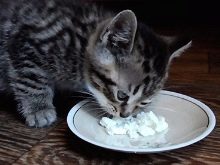
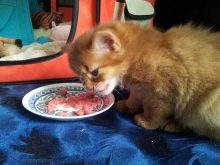

The combination of dry and wet food will be the most favorable for the pet, as it will saturate the body with all the necessary elements, and will also make it possible not to experience problems with emptying.
Health care
If the kittens live with the cat after birth, then she decides all the issues of their care and health on her own. The owner can only help the mother a little, creating the necessary conditions for a comfortable life for the whole family. If the kids are left alone a person must make a lot of efforts to replace his mother, creating the same comfort and giving a certain care.
In the first weeks it is very important to keep babies warm, as they are still very small and the coat does not provide them with the necessary warmth. The kittens' habitat should be heated with a controlled temperature, this can be a heating pad or a simple bottle of water.
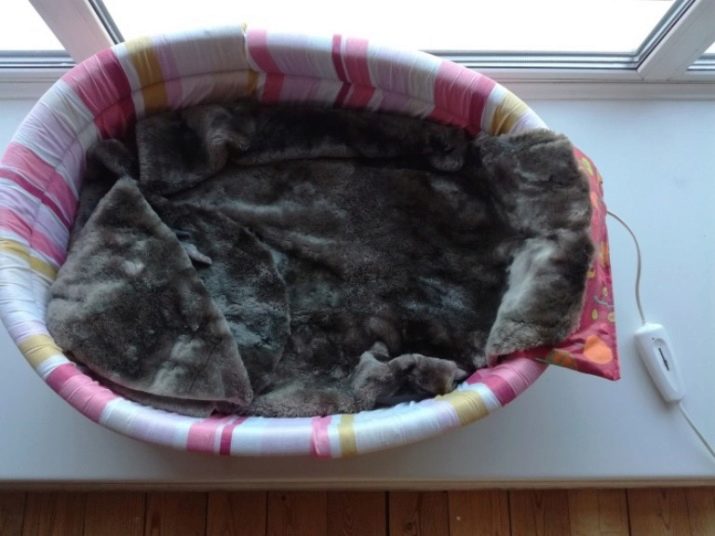
The offspring that grows up without a mother should have full-fledged socialization, it is the person who provides it. If it is better not to touch tiny kittens unnecessarily, giving them the opportunity to sleep and rest, then from the moment they begin to walk, it is important to play with them, communicate, stroke them, giving warmth and love. As soon as the kitten grows up, it must be introduced to the household items: resting place, tray, bowl and toys. The toilet takes an important place in the life of a house cat, since the inability to use it will cause a lot of problems.
It is important to purchase a tray of a suitable size and with low sides so that it is convenient for your pet to use it. The filler should only be natural, as kittens can taste it, confusing it with food. At first, it is important to monitor the visit to the litter box to make sure that the pet relieves himself correctly and does not harm himself.
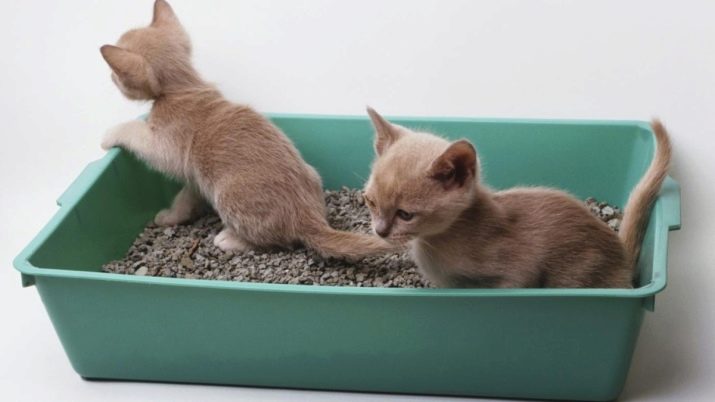
To give the kitten the necessary rate of activity and help its socialization, it is necessary to play with it often, for which it is better to purchase specialized toys and balls. The play process is best intertwined with parenting, controlling the kitten's behavior and preventing him from scratching or biting. With regard to direct health care, a good owner must foresee all the risks, even if the cat will not leave the territory of the apartment.
Timely vaccination against plague, rabies and various infections will be an important component of care. For the safety of the animal, you need to ensure that ticks, fleas, lichen and helminths do not appear in it, if they are found, you need to immediately take action or contact a veterinarian.
Hygiene procedures will be limited to occasional rubbing of the animal's fur, and in very rare cases, bathing.
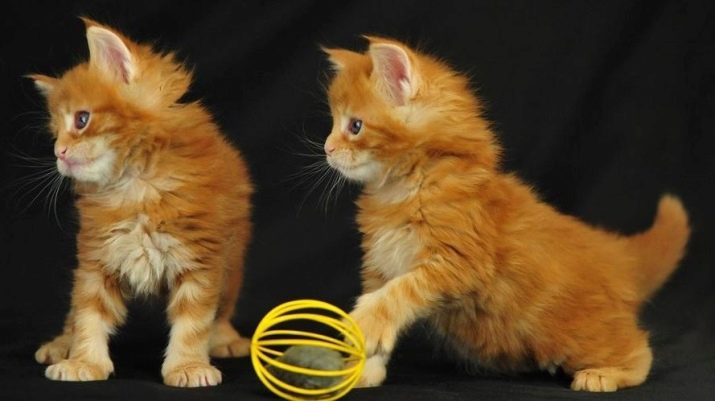
Helpful hints
If a cat has kittens, it is important to know that you should not touch them after birth, since the mother-cat will not be happy with this and may attack the owner. To help the socialization of small kittens, they can be picked up no earlier than the second week of life, and then for short periods, so as not to upset the cat.
The baby's body is still very fragile, therefore you need to handle him carefully and gently so as not to injure. It is very important to explain this nuance to children if they are in the family, since they can accidentally hurt the kitten, or even break something altogether.
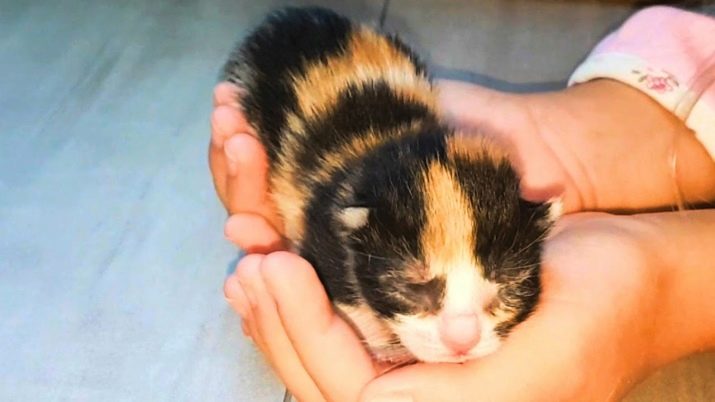
To make life with a kitten, and later with an adult, comfortable, it is important to protect the apartment from the sharp claws of the pet. The best solution to this problem will be a scratching post, which will allow you to exercise on it, grind off the claws, and completely protect furniture and wallpaper from an agile pet. There is a large selection of such devices in pet stores, so choosing an option that suits in terms of size, price, color and functionality is not difficult.
To maintain an attractive and neat kitten, you will need to purchase a special comb that will help to remove unwanted hair... Especially during the molting period, it will prevent the formation of pellets in the body of the kitten, which licks itself.
Using a regular or plastic comb is absolutely not suitable for cats, so you need to buy specialized equipment.
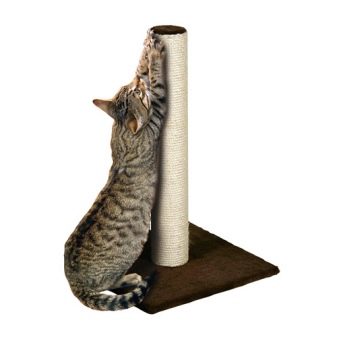
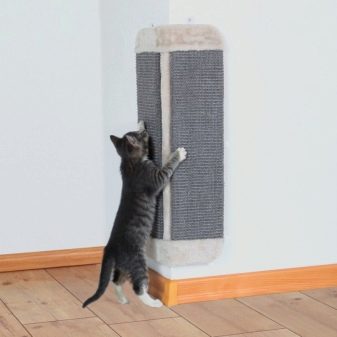
The process of playing and upbringing should be familiar to a kitten, but a person is not always able to properly train an animal or wean it from some kind of habit, therefore it is better to acquire specialized harmless spray. It will scare your pet away from places where you can't go to the toilet or where you shouldn't run or jump. There are also attractive varieties to help lure your pet into a carrier or house. Caring for and caring for a kitten will be incomplete without brushing teeth, which often deteriorate, causing many problems.
If you do not teach your pet to calmly go through this procedure in childhood, then at an older age it will be much more difficult. To make the process easier, you should buy a toothpaste with a taste of meat or fish, as well as a high-quality and comfortable toothbrush. Another important event is ear cleaning, necessary for the prevention of ticks. Kittens love this procedure, so they will be happy to lie in their arms while the owner does everything.
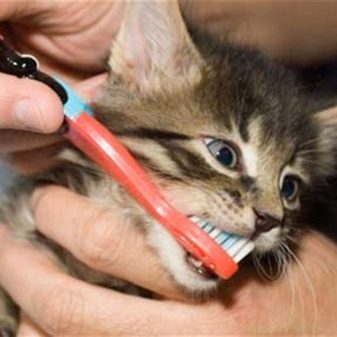

Thanks to proper care of kittens, even without the fate of a cat, kind and affectionate friends of a person can grow out of animals, who will know the order in the house, obey the owner, do not offend children, and do not scratch furniture. The life of a pet will be rosy and long if the owner takes timely measures to ensure the health of the cat.
For more information on how to leave a newborn kitten without a mother cat, see the next video.
